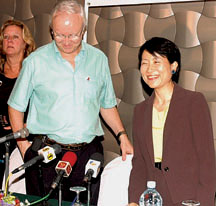|
dailynews |
|
|
|
|
|
OTHER LINKS |

|

|

|
CommentThe World Bank, the JVP and poverty reduction
WB POLICY: Peter Harrold, the outspoken World Bank Country Director for Sri Lanka last week in yet another attempt to set the record straight about the World Bank's role in Sri Lanka reiterated that the Bank's mission here is not to help the Government to privatise state owned entities. He said some leftist political parties, specially the Janatha Vimukthi Peramuna have a wrong view that the World Bank is here to sell state assets to multinational corporations. Harrold, who ends his service as Country Director for Sri Lanka this year urged last week the JVP to change this attitude towards the World Bank. He hoped, the new Country Director Naoko Ishii would be able to do so during her stay here starting from September 1. How easy will it be to portrait the World Bank as an institution which is committed towards the development of this country. Is it really committed to reduce poverty in this country, or its sole agenda is to promote privatisation by pressurising the government for reforms in key sectors? Is the JVP's allegation due to ignorance, or based on fallacy? These are a few questions which have been asked, for the last 30 years and still have no answers. Sadly, the JVP, the party which makes these allegations has not yet made an all out effort to prove that its allegations are based on true facts for the benefit of the public. On the other hand the World Bank has not shown enough interest in proving these allegations are baseless. So, the questions would continue to remain unanswered as long as the World Bank continues to operate in Sri Lanka. There is no doubt that the World Bank has contributed immensely towards poverty reduction in the developing world during the last five decades. The number of World Bank assisted projects in the rural areas of the country would be evidence of how much the Bank spent to raise the living standards of poor people in these areas. Ironically, the allegations against the Bank come from a political party which mainly represents the very poor segments of the rural community. And, it is also a party which has the support of energetic rural youth whose talents could be utilised effectively in carrying out successful development activities in these areas. That is why it is vital that this strong emerging political force should shed its differences with this international development agency which has enormous resources to develop our rural areas. Another reason why it is difficult to paint a positive picture about the World Bank among the rural poor could be the ever widening gap between the rich and the poor in this country. According to World Bank economists poverty in the rural areas despite various development programs still remains much the same while the income of rich people have quadrupled during the last decade. The country's per capita income has grown above US$ 1000 but the income of the poorest 20 percent of the country is stagnated. It is not the World Bank which is responsible for this vast social imbalance. It is the wrong political system which has been in this country since independence. However, the World Bank is criticised for its approach towards addressing this problem. The World Bank has said it is vital to introduce reforms to the agriculture sector in order to develop the rural areas. Reforms, be they in the agriculture, education, health or energy sector are looked at suspiciously by leftist political parties such as the JVP. Perhaps, one reason why these efforts towards reforms have failed is because they are only discussed among groups and individuals who have very little insight into rural life and sometimes with the involvement of parties alleged to have vested interests. The criticisms levelled against the World Bank internationally too do not help its image in the developing countries. There are allegations that nearly 50 percent of the World Bank lending to poor countries each year is dispensed directly to Western transnational corporations. One of the most reputed World Bank Presidents, Barber Conable said in 1990: "We know a great deal about who the poor are, where they are, and how they live. We understand what keeps them poor and what must be done to improve their lives." However, according to US media in 2000, the Joint Economic Committee of the US Congress found a failure rate of 55-60% for all World Bank-sponsored projects. In Africa, one of the poorest regions of the world the failure rate reached 73 percent. Therefore, considering the global and local experiences of the World Bank in its efforts towards helping the poor the new Country Director has a difficult task in clearing the image of the Bank among a section of the Sri Lankan society, the participation of which is essential towards eradicating rural poverty. Otherwise, it will not take long for her to understand how challenging it is to uplift the lives of rural people who suffer at the hands of social inequity mainly due to political failures. The increasing social divide can only make things more difficult if these rural elements begin to consider the world would be better off without the better-off. |







